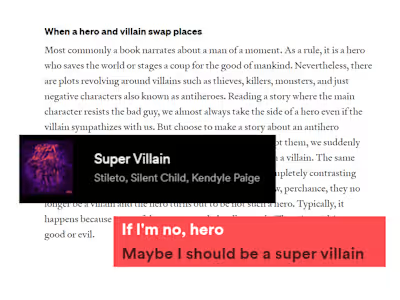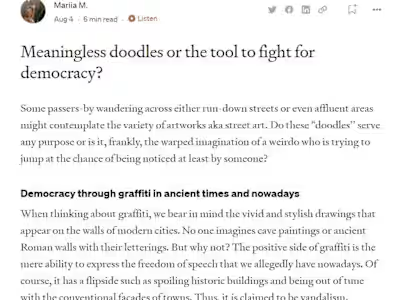Essay | On Flourishing: Questions that are never to be answered
On Flourishing: Questions that are never to be answered
Less and less I can see the light in this world, the kindness and finesse of it. Hatred, envy, corruption, ignorance, greed—the list of our sins is endless—are omnipotent and dominating.
Will we ever behold the very Utopia that almost everyone ruminated on but never had an explicit image of? Most movies and books attempt to reveal the putrefaction of society through the dystopian realm and the possible odious future that awaits us. The creators of those bleak stories and their imagination sagaciously pinpoint the flaws of the current system and ideology in which we live, the society that surrounds us, and the discursive viewpoints that we have at present that might lead to the disruption of reality in the future—the well-known dystopias—by alleged progress toward the positive changes of this system but indeed the opposite one—the steep decline of the system started long ago.
However, the more I hear, see, and read about what happens around the world, within countries, between countries, within society, and within families, the more I think that those people who have watched or read dystopian stories are either ignorant or deride the vain exertions of authors to open people’s eyes by stubbornly and willfully moving to the precipice enlightened in their works.
Our contemporary society is a theater: people who have adjusted to the rotting system are sitting in separate boxes; others, who are ardently trying to adjust and fit in, would place balconies and stalls; and people, who are surviving, occupied rush seats and standing rooms; the lowest caste of society might not even be present here. Hence, they are excluded from what’s happening in society; they have a low impact on making any changes—they would believe so.

Such a structure of a theater allows to divide space between all people—those who can afford the best seat and those who want to see a play—not bothering if they are in the “royal” box. Anyway, it works in theaters, and we cannot provide equal seats for everyone there. Yet society should not resemble theater, as by creating a system that provides equal rights not only on paper but de facto, castes, hierarchy, the wealthy and poor—all these terms—would not exist.
Everything begins inside us as a sole personality. We are born with this sick system in our heads. But recently, I realized that, by virtue of some reasons, I have no conviction, perception, or comprehension of the system we endure. Regardless of the environment in which a person was born, they might have, I would dub it, either the ability or defect not to look at society through an imaginary prism of supremacy and inferiority that many do.
How can society flourish when there are wars everywhere? Wars between families, wars between friends, wars between companies, and wars between countries. There is no end to this. The world is concentrating on the conflicts rather than the flourishing, such as developing new technologies that would prolong our lives, fighting homelessness, poverty, hunger, and cancer, and protecting our planet, as we are the culprits of its anguish and misery.
They say, not always directly, that war is necessary, enmity toward other people, language, and culture is required, and candid rapture of those people’s sorrow is acceptable. That’s the point when the burden of realization falls on you—society is completely sick.
Was this sickness always a part of us, or did we turn to the wrong path at some point in human history? The old generation would say that everything began with a new one, with the generation of technology and the future. However, when reading classical literature of the eighteenth century or even earlier, you clearly see that all patterns of society stem from those stories. Not surprisingly, it is called “classical” literature—literature that will always be pertinent.
What is the root of the ubiquitous disease, and is there a root for it at all? Perhaps it is our nature incarnated in our souls? I do my best not to believe such a premise. The very ground might be inveterate, but the reason for it is that all people are different. A slew of opinions, thoughts, and decisions that affect the course of our history in the past, future, and present exist; each mind has never been identical. Thus, there is nothing amiss with us, and it is indeed our nature, but nature to be different and to have various viewpoints.
Can our world await convalescence in that case? Moreover, does society deserve it? What if the obstacles that we encounter not only as individuals but as a whole community are trials that we have to surmount in order to live in Utopia? The question is: will we be successful in it? No one can answer this for sure, but if we keep moving in the same direction, the outcome is apparent.

Finally, can we blame anything for such a drastic deterioration of our society, or were such flagrant events following the mob throughout all centuries? Obviously, all conflicts, wars, and miseries have always accompanied us. What explains the fact that it seems worsening is that we endure it in real time, so it is tangible and feels harsher.
Ruminating leads to much more questions, and so it can be never-ending. The message that should have been conveyed is the importance of asking the questions that matter to flourish. The conception of flourishing and striving depends on each person and community, on a particular religion and political regime. This diversity is both the so-called root of our sickness and the thing that makes us so unique. The universe was built to be complex, peculiar, and fascinating, and so were our society and our minds.
Like this project
Posted Oct 17, 2023
An article from my Medium Blog
Likes
0
Views
3






